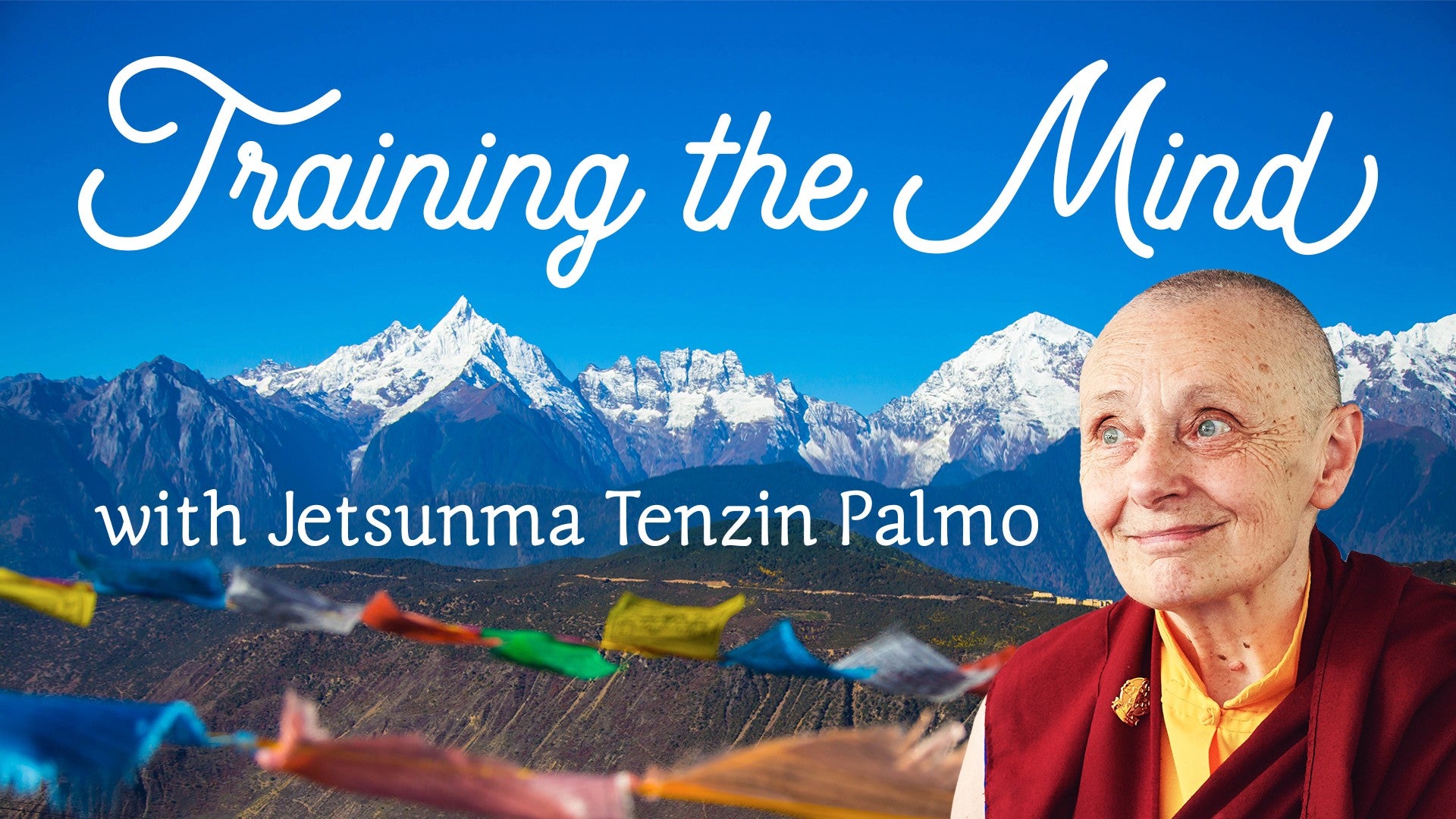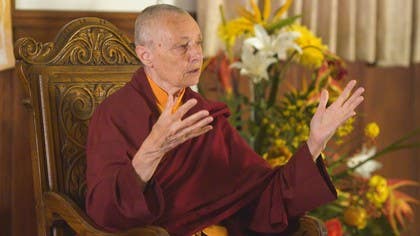Description
About This Video
Transcript
Read Full Transcript
The Supreme, so now he's going to go through what are called the six paramitÄ쳌. The six, sometimes people imagine, especially in the West, that enlightenment is just about meditation. And that as long as they do their regular meditation retreats, they're on the path to enlightenment. Ha. Ha.
Ha. Ha. Ha. Ha. According to the sutras, many qualities apart from meditation need to be developed.
And gradually in the Mahayana sutras, this was codified into six basic qualities needed for bodhisattva, on the path towards enlightenment for the sake of all beings. So these are ethical conduct, patience, effort. We have to make some, we have to have an enthusiasm for the path. If we don't have an enthusiasm for the path, then we won't accomplish anything. So first, the first paramitÄ쳌 is generosity.
So we'll go through it, generosity, ethics, patience, enthusiastic effort, meditation, and supremely wisdom. Wisdom means seeing things how they really are. So now he's going to go through these, but with his own twist. So he says, the supreme generosity is non-attachment. If we only took that into our hearts, that would accomplish the path.
Normally when we think of generosity, we think about giving things, sharing things, and this is very much a part of generosity. Giving not only money and possessions, but also giving our time. If people are in need, that we sit and we listen to them, and that we help them. So this is also generosity. And especially the generosity of sharing the dharma, meaning any kind of spiritual understanding that we have, books, anything which we saw on YouTube and that we think is good, or anything that we have that we can share with others, if they want to be shared with.
It doesn't mean that we have to force them. We're not going around knocking on doors. But if people are interested, then we can say, hey, I read this really good book. Try it. Find them that in ethics, there is an ethic of non-stealing, and taking a book and not returning it could be counted as stealing.
But anyway, generosity is usually understood as sharing what we have with others, whether it's possessions, money, time, or knowledge, whatever we have, we are happy that others should have. But what is the basis of that? The basis of that is non-attachment. If we are non-attached, then naturally things flow. We had this Swami friend in India called Ramananda.
He was actually a direct disciple of, one of the problems of old age is you forget names. Oh, he's such a famous Swami. I'll think of his name in a minute, it'll come to me. So he was a direct disciple of him, but wherever he was always into the question, who am I, he was in Tiruvannamalai. Who was the great woman?
Ramana Maharishi. Ramana Maharishi. That's it. So Ramana Maharishi, he was a direct disciple of his. But whereas Ramana was more into Jhana Yoga and asking, who am I, this Swami Ramananda was very much a Bhakti Yoga.
He was very much in devotion and faith and very lovely guy. He lived up near us in a very simple mud-built ashram, very, very simple. But because he was a very impeccable Swami, a genuine Swami, a genuine sadhu, he had a quite a lot of disciples, some from the Punjab. And in those days, things were not manufactured in India the way they are nowadays. Nowadays, you can get everything, but in those days, you couldn't get anything.
It was very difficult unless somebody brought them in from abroad. And so his disciples would bring him all these sort of goodies from abroad, which you couldn't get in India, all sorts of gadgets and various things. And they would present to him. And he would open the package and look at it all and be so excited, oh wow, that's fantastic. Oh, and he would play with it.
And he would really enjoy it enormously, and there would be Swami. And then he would think, and what he was thinking is, wow, this is so nice. Now who would like to have this? And immediately he would say, hey, you, you, you, come here. And he just gave it away.
His hands were not sticky. It wasn't that he, what I admired about him, not only that he gave everything away, but that he didn't disdain it. Oh, I'm above this. I'm a sadhu. Why are you bringing me this?
You know, I don't do this sort of thing. He would have delight so that the person who had given it to him would be happy that he liked it so much. And then when he gave it away in front of them, they accepted it. So like that, he was genuinely non-attached. So he could enjoy, but he didn't want it.
So that, the basis of his generosity was not because he was trying to make merit, not because he even felt pity for the person that he was giving to, or not because he was trying to impress people, but genuinely because he didn't want it. I mean, he was very nice. And if he'd wanted it, he would probably kept it for a while and then given it away again, but he didn't grasp it. He was genuinely unattached, happy, happy, happy. So therefore, this idea that genuine generosity, openness of the heart, starts with the heart.
It's because we're not grasping, therefore things slide off. Mostly our minds, mostly our minds are like Velcro. You know Velcro? It has all these little hooks and it catches on to everything and it's very hard to get it off again. So this is our mind.
We see something we like and we, and so what we need to develop is attention. A Teflon mind, right, slides off, non-stick, a non-stick mind, that's what we need. And that is based on non-attachment. You know, there's this famous example that illustrates the point of grasping is, I'm sure most of you know this example. I don't even know if it's true, but it's said that in Indonesia, there is this monkey trap which is made of a hollowed out coconut and with a little hole nailed to a tree.
And inside the coconut is this coconut sweet. And so the monkey comes along, it smells that sweet, it puts its hand into the hole and grasps the sweet, so now it's a fist and then it can't get out. So then the hunters come along and the monkey is terrified and really wants to go. But at the same time, the greed in its mind does not allow it to let go of that sweet. All it has to do is let the sweet go and then it can run, but it can't.
Yes, it wants to escape, but it wants the sweet at the same time. This is us. Yes, yes, we want to be liberated, but at the same time, isn't it? So the supreme generosity is non-attachment. Doesn't mean we cannot have things, I mean, how's the time doing?
The other story which I often tell to express this is about the king and his guru. So there was a king in ancient India and he had a big palace filled with beautiful things and very magnificent, but he was a very devout king and he had a guru who was very renounced. All he had was a loincloth, the king was all in his silks. He had a loincloth and all he owned was his wooden begging bowl, his arms bowl. And so one day they're sitting in the pleasant grove of the palace under a tree and the guru is teaching.
And in time the servants come running up and saying, Maharaj, Maharaj, quickly, quickly, the whole palace is in flames, please come. And the king says, don't bother me, you deal with it. I am studying dharma with my guru. And then the guru jumps up and said, what do you mean? I left my bowl in the palace.
There's a point. Truly, it's not what we own, but what owns us. We can have nothing and be attached to having nothing. We can have the world and still, if we lose it, so what? I mean, recently with all these fires, in these terrible, terrible fires in California, it was, again, an object lesson for people.
How much of all that they lost were they really attached to? Because we built a beautiful home, where's the security? We have to appreciate. The only way to be secure is in insecurity, recognizing that nothing is secure. If we feel secure in that insecurity, then we're secure.
Because then whatever happens, we would deal with it. But if we cling to the idea that everything has to stay how it is and nothing changes, then that is very insecure. Because everything is changing constantly. And what we have today, we don't know we're going to have tomorrow. So this is why this ability just to be open and accepting is so important for our inner well-being.
And it doesn't mean that we don't love things or appreciate things, but it does mean we don't grasp them. So I think the Buddha taught generosity as the first of the Paramitas, the first of the perfections. Because this is something which we can all do, even if we don't have patience. Even if we can't concentrate for two minutes consecutively, even if we get upset and angry and all these other things, we can still cultivate being generous, all of us. Not only generous of money and things, possessions, but generous of time and just have a heart which is ready to accommodate other people's needs as much as possible.
I mean, that open generosity of a heart, it starts in the heart. This is why he said that supreme generosity is non-attachment. It starts from our own inner responses, our own inner openness.
Training the Mind with Jetsunma Tenzin Palmo
Comments
You need to be a subscriber to post a comment.
Please Log In or Create an Account to start your free trial.









